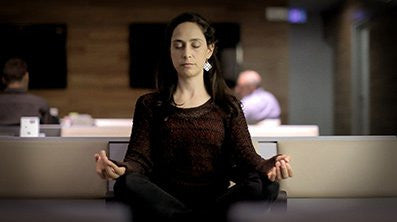
In the 1960s, a young cardiologist named Dr. Herbert Benson had been sneaking transcendental meditators through the back door of his lab at Harvard University to study what happened to their body when they meditated. The result of his work was one of the major breakthroughs in modern mind body medicine.
Dr. Benson found dramatic physiological changes in the bodies of his subjects. He recorded decreased metabolism in the body, decreased heart rate, decreased rate of breathing and slower brain waves. He called his discovery the ‘relaxation response’ to suggest its role as a counter part to the stress response which had been discovered in the exact same lab at Harvard Medical School by Walter B. Cannon in the 1920s.
His discovery heralded a new era of scientific enquiry into how the mind and body interact to influence our health outcomes. “This now was science. Here was something measurable, predictable and reproducible,” says Benson.
I interviewed Dr. Benson for The Connection because he is considered by many people to be the founding father of modern mind body medicine. Now in his 80s, Dr. Benson has dedicated his life’s work to the study of the relaxation response and I was amazed to find that his groundbreaking research continues to this day.
Recently, his team at the Benson Henry Institute for Mind Body Medicine looked at the genetic expression of people who evoked the relaxation response and the results revealed that it can flip the switched on genes affecting disease. More remarkably, they discovered that the genomic expression changes occur the very first time you evoke the response. The more times you do it daily, the more anchored the response.
This was a break through moment in my own healing journey. Doctors had told me that my autoimmune disease was genetic in nature, that I just had bad genes and there wasn’t much to be done. But here was a professor of medicine from Harvard telling me that even the expression of the genes causing my illness could be changed. The next question I had was how could I ensure that I was evoking the relaxation response when I meditated and the answer was remarkably simple.
When we meditate we’re encouraged to focus our attention on just one thing such as our breath, or sensations in the body, or the sounds around us. When other thoughts rise up, we’re encouraged to let them go and return to our focused awareness. According to Dr. Benson’s research, this is central to evoking the relaxation response in the body. “The two basic features of evoking the relaxation response are a repetition and the disregard of other thoughts when they come to mind. And what those two things do is break the train of everyday thinking,” says Benson.
Dr. Benson explains that it’s often the train of everyday thinking that is causing stress in our lives. We’re worried about things that have happened in our past or may happen in our future and those thoughts are causing stress chemicals and hormones to be released in our body.
When Dr. Benson returned to the literature of the world to see whether these two steps that are breaking the train of everyday thinking had been described before, he was astonished to find that every single culture of human kind had these two steps. “There’s a commonality. So if a person argues my technique or my religion is better for bringing this forth than another, it’s foolish because it’s a bodily response. Just as there are scores of techniques that are stressful - same fight or flight response - so there are scores of approaches that evoke the relaxation response,” he says.
I hope you enjoy this extract from The Connection where Dr. Benson explains how to evoke the relaxation response.





 The Connection (DOWNLOAD-TO-OWN)
The Connection (DOWNLOAD-TO-OWN) My Year Of Living Mindfully - Book
My Year Of Living Mindfully - Book




